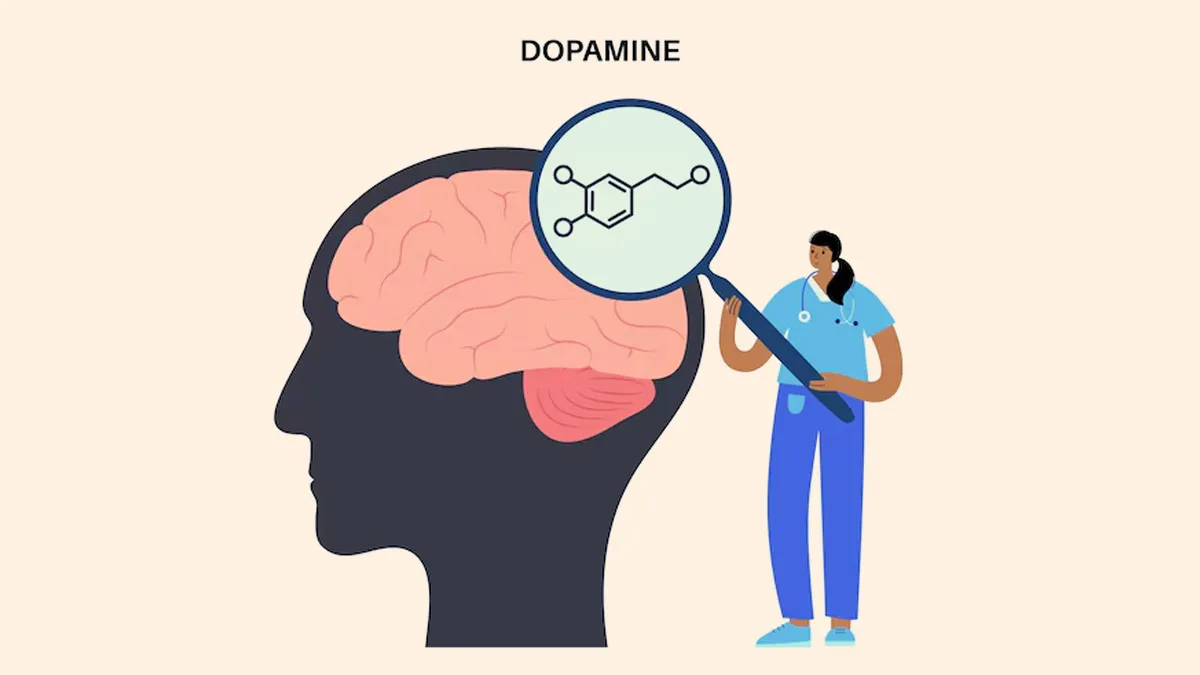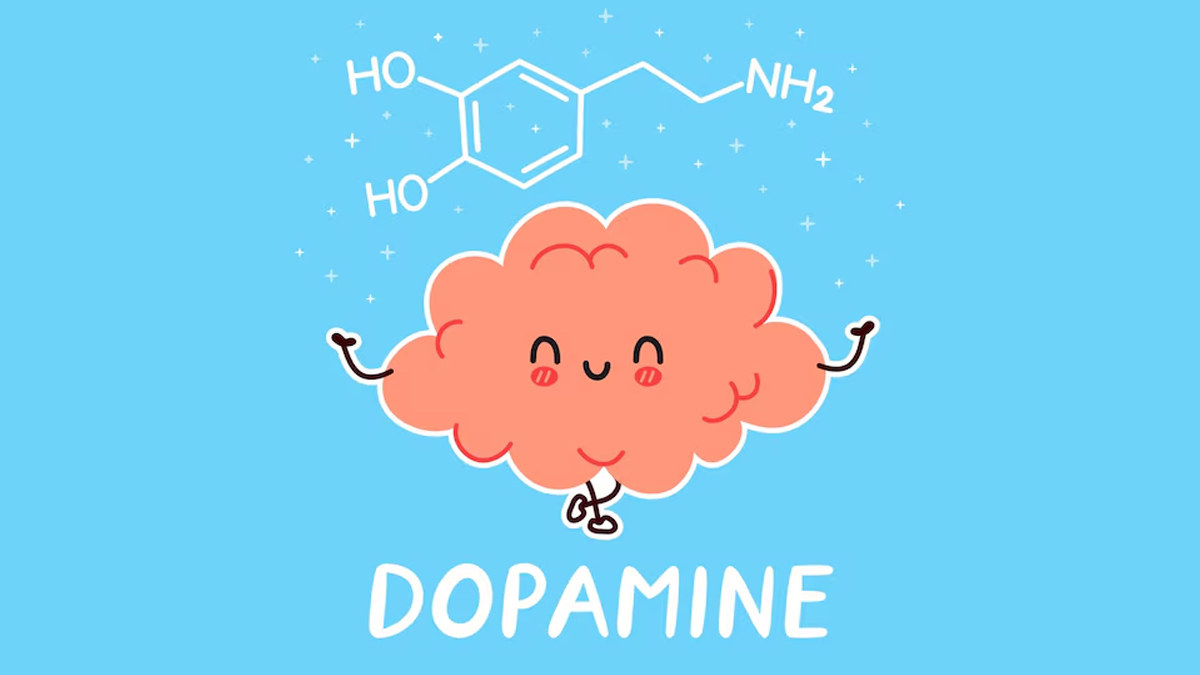
Have you ever found yourself endlessly scrolling through social media or binge-watching your favourite TV shows, losing track of time? That rewarding feeling you experience comes from dopamine, a powerful chemical messenger in the brain often dubbed the ‘feel-good’ neurotransmitter. While dopamine fuels our motivation and sense of pleasure, it can also lead us to crave more of the activities that trigger its release. But is it really possible to be addicted to dopamine? And how do these behaviours impact your overall health?
Table of Content:-
CHECK YOUR
MENTAL HEALTH

We spoke to our expert Dr Sonal Anand, Psychiatrist, Wockhardt Hospitals, Mira Road, Maharashtra, who explained the dopamine’s role in our lives and the fine line between healthy enjoyment and excessive indulgence.

Dopamine, commonly known as the 'feel-good' neurotransmitter, is a chemical messenger crucial to the brain's reward system. It is released during pleasurable experiences like eating, exercising, or even using social media. Beyond pleasure, dopamine influences essential functions like movement, memory, mood regulation, and attention. While dopamine itself isn’t inherently harmful, the behaviours it encourages can sometimes spiral into excessive patterns, leading to what some term 'dopamine addiction.'
A 2021 review highlights that dopamine plays a role, either directly or indirectly, in nearly every function of the Central Nervous System (CNS), which includes the brain and spinal cord. Additionally, it impacts processes beyond the CNS, such as those involving the immune system and the gut-brain axis.
What is Dopamine Addiction?
“Dopamine addiction is a term often used to describe the brain's heightened response to activities that trigger its release. However, it’s important to clarify that one cannot be addicted to dopamine itself. Instead, people may develop a dependency on behaviours or activities that cause frequent dopamine surges,” explained Dr Anand.
In today’s hyper-connected world, activities like endlessly scrolling social media, binge-watching TV shows, or compulsively checking notifications are common culprits. These actions flood the brain with dopamine, creating a rewarding cycle that can be hard to break. Over time, this dependency on dopamine-inducing behaviours may lead to obsessive patterns that interfere with daily life.
Also Read: What is Dopamine Chasing? Signs You Should Know About and Management Tips
Activities That Trigger Dopamine Release
Dopamine release is a natural response to pleasurable or rewarding activities. Dr Anand listed some common dopamine-triggering activities as follows:

- Eating: Enjoying a favourite meal or dessert
- Exercising: Physical activity promotes the release of dopamine, leading to the so-called 'runner’s high.'
- Listening to music: Hearing a favourite song can activate dopamine pathways.
- Having sex: This activity is strongly linked to dopamine release due to its rewarding nature.
- Consuming caffeine: Drinking coffee or other caffeinated beverages stimulates dopamine production.
- Meditation: Mindfulness practices are associated with increased dopamine levels, promoting feelings of calm and happiness.
While these activities are generally healthy and beneficial in moderation, overindulging in them can have unintended consequences.
Impact of Excessive Dopamine-Inducing Activities
Engaging in dopamine-releasing activities excessively can disrupt both physical and mental well-being. The following issues may arise:

- Anxiety and stress: Overindulgence can overstimulate the brain, leading to heightened stress levels.
- Restlessness and agitation: Difficulty concentrating or feeling at ease may develop.
- Relationship problems: Obsession with certain activities can strain personal relationships.
- Physical symptoms: Headaches, changes in appetite, weight loss, nausea, and abdominal pain are common.
- Behavioural changes: Frustration, irritability, and inability to focus may also occur.
The key to avoiding these problems is balance. Recognising the fine line between healthy enjoyment and excessive indulgence is crucial for maintaining overall well-being.
Also Read: Serotonin Vs Dopamine: Expert Explains The Difference Between These Happy Hormones
How to Reduce Dependency on Dopamine-Triggering Activities
Breaking free from excessive reliance on dopamine-inducing behaviours requires conscious effort and practical strategies. Here are some tips:

- Set boundaries: If you are doing any activities, such as exercising, listening to music, caffeine, and meditation, then don’t do it in excess. Don’t get overly obsessed with any one activity at a stretch as this can be problematic.
- Deep breathing: If you are excessively addicted to any dopamine-related activity then do deep breath breathing, yoga, or meditation to calm down and relax.
- Counselling: This can be helpful if there is an addiction to any dopamine-releasing activity. One should openly talk about things that bother him or her instead of being silent. Meal or dessert that is tasty, exercising, listening to music, caffeine, and meditation, seek help without any delay to overcome the addiction.
Understanding the Balance
Dopamine is essential for motivation, reward, and pleasure, but the behaviours associated with its release can become problematic when taken to extremes. Activities like eating, exercising, and even meditating are beneficial in moderation, but overdoing them may lead to physical discomfort and emotional distress.
[Disclaimer: This article contains information provided by an expert and is for informational purposes only. Hence, we advise you to consult your own professional if you are dealing with any health issues to avoid complications.]
Also watch this video
How we keep this article up to date:
We work with experts and keep a close eye on the latest in health and wellness. Whenever there is a new research or helpful information, we update our articles with accurate and useful advice.
Current Version